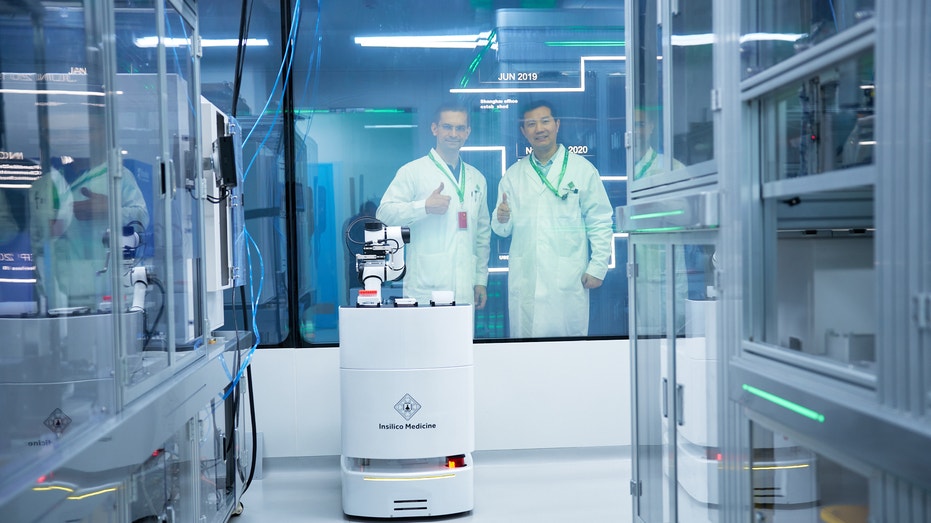The first-ever drug generated by artificial intelligence has entered Phase 2 clinical trials, with the first dose successfully administered to a human, Insilico Medicine announced yesterday.
The drug, currently referred to as INS018_055, is being tested to treat idiopathic pulmonary fibrosis (IPF), a rare, progressive type of chronic lung disease.
The 12-week trial will include participants diagnosed with IPF.
“This drug, which will be given orally, will undergo the same rigorous testing to ensure its effectiveness and safety, like traditionally discovered drugs, but the process of its discovery and design are incredibly new,” said Insilico Medicine’s CEO Alex Zhavoronkov, PhD, in a statement to Fox News Digital.
FIRST NEW ‘QUIT-SMOKING’ DRUG IN 20 YEARS SHOWS PROMISING RESULTS IN US TRIAL: ‘HOPE AND EXCITEMENT’
“However, with the latest advances in artificial intelligence, it was developed much faster than traditional drugs.”
For any new drug, there are four steps, explained Zhavoronkov, who is based in Dubai.
“First, scientists have to find a ‘target,’ a biological mechanism that is driving the disease, usually because it is not functioning as intended,” he said.
“Second, they need to create a new drug for that target, similar to a puzzle piece, that would block the progression of the disease without harming the patient.”
The third step is to conduct studies — first in animals, then in clinical trials in healthy human volunteers, and finally in patients.
RESEARCHERS USE AI TO UNDERSTAND ALZHEIMER’S DISEASE, IDENTIFY DRUG TARGETS
“If those tests show positive results in helping patients, the drug reaches its fourth and final step — approval by the regulatory agencies for use as a treatment for that disease,” said Zhavoronkov.
In the traditional process, he said, scientists find targets by combing through scientific literature and public health databases to look for pathways or genes linked to diseases.
“AI allows us to analyze massive quantities of data and find connections that human scientists might miss, and then ‘imagine’ entirely new molecules that can be turned into drugs,” Zhavoronkov said.
In this case, Insilico used AI both to discover a new target for IPF and then to generate a new molecule that could act on that target.
AI TECH AIMS TO HELP PATIENTS CATCH DISEASE EARLY, EVEN ‘REVERSE THEIR BIOLOGICAL AGE’
The company uses a program called PandaOmics to detect disease-causing targets by analyzing scientific data from clinical trials and public databases.
Once the target was discovered, researchers entered it into Insilico’s other tool, Chemistry42, which uses generative AI to design new molecules.
“Essentially, our scientists provided Chemistry42 with the specific characteristics they were looking for and the system generated a series of possible molecules, ranked based on their likelihood of success,” Zhavoronkov said.
The chosen molecule, INS018_055, is so named because it was the 55th molecule in the series and showed the most promising activity, he said.
The current treatments for idiopathic pulmonary fibrosis are pirfenidone and nintedanib.
While these drugs may provide some relief or slow the worsening of symptoms, they do not reverse the damage or stop progression, Zhavoronkov said.
They also have unpleasant side effects, most notably nausea, diarrhea, weight loss and loss of appetite.
“There are very few options for people with this terrible condition, and the prognosis is poor — most will die within two to five years of diagnosis,” Zhavoronkov explained.
“Our initial studies have indicated that INS018_055 has the potential to address some of the limitations of current therapies.”
The Insilico team is hopeful the data from this newly launched clinical trial will confirm the drug’s safety and effectiveness.
CLICK HERE TO SIGN UP FOR OUR HEALTH NEWSLETTER
“If our Phase IIa study is successful, the drug will then go to Phase IIb with a larger cohort of participants,” said Hong Kong-based Sujata Rao, M.D., Insilico’s chief medical officer, in a statement to Fox News Digital.
During Phase IIb, the primary objective will be to determine whether there is significant response to the drug, Rao said.
“Then, the drug will go on to be evaluated in a much larger group of patients — typically hundreds — in Phase III studies to confirm the safety and effectiveness before it can be approved by the FDA as a new treatment for patients with that condition,” he explained.
One of the biggest challenges with these trials is recruiting patients, Rao said, particularly for a rare disease like idiopathic pulmonary fibrosis.
“Patients need to fulfill certain criteria in order to be considered for trial enrollment,” he noted.
Despite the challenges, Rao said the research team is optimistic that this drug will be ready to go to market — and reach the patients who may benefit from it — in the next few years.
Article Source: Health From Fox News Read More




